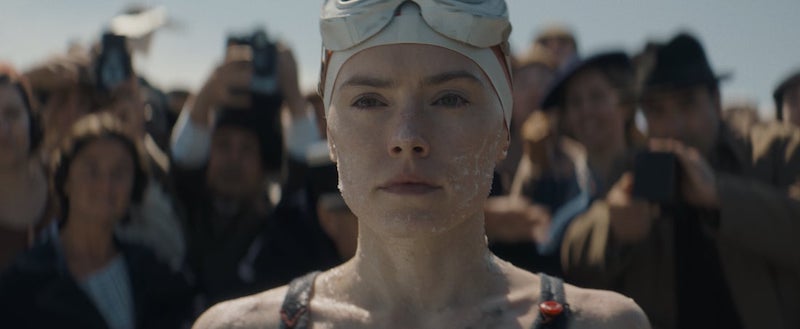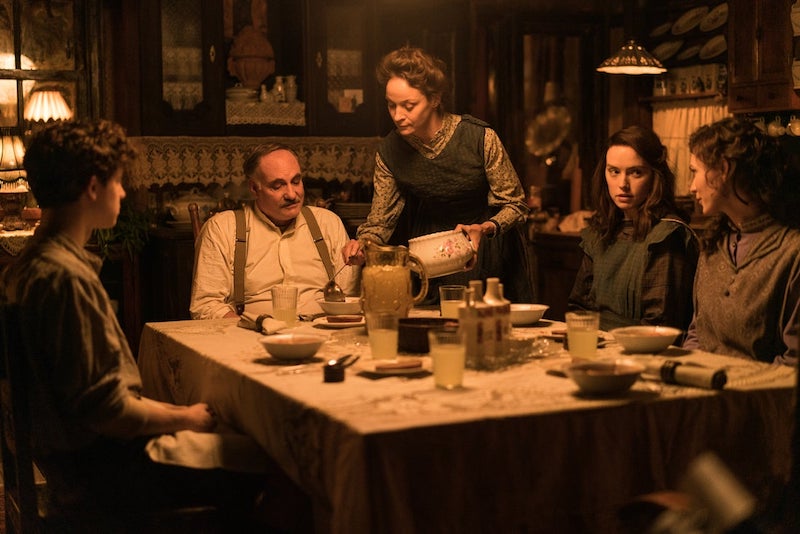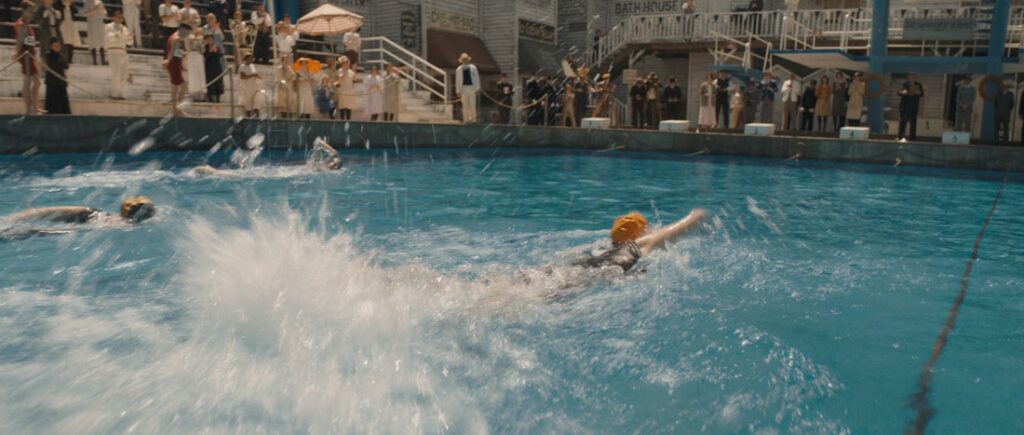Though most Disney inspirational sports features follow the standard biopic formula, with some taking creative liberties for a dramatic effect, nearly all of them have audiences walk away feeling uplifted and even inspired by an underdog overcoming incredible odds to defy expectations set by society and outdated norms. Such is the case for Joachim Rønning’s “Young Woman and the Sea,” a based on a true story sports biopic that centers on real-life American swimmer Gertrude “Trudy” Ederle (Daisy Ridley), who became the first woman to swim the English Channel.

Considering Rønning’s familiarity with true stories about near-impossible maritime voyages (see his outstanding “Kon-Tiki”) that pushes the subject’s mental and physical limits, something like “Young Woman and the Sea” right in his wheelhouse. These implausible stories about athletic underdogs who are underestimated by their male sponsors and coaches yet inspiring to those in the community may be conventional in their execution. Still, its cinematic feel, plus Ridley in her most physically demanding role to date, draws audiences in and has them cheering her on as if they were right there with Trudy Ederle.
As with most of these sports biopics, the subjects had to face great adversity to achieve their goals. Of course, championships and medals are one thing, but at the heart of the story is how the subject overcomes setbacks to become winners in more ways than one. And that couldn’t be truer for Trudy, who not only overcame physical limitations, including her fight with measles at an early, being underestimated, and the men who believed letting women swim was an act of benevolence but was a twisted means to discourage the opposite gender from ever participating in male-dominated sports. Even at an early age, her father, Henry Ederle (Kim Bodnia), forced his youngest daughter to sit in the stands while watching her sister Margaret “Meg” Ederle (Tilda Cobham-Hervey) swim. But instead of accepting her fate, Trudy decides to make her own destiny. And it all started with a ukulele and singing Peggy Lee’s Ain’t We Got Fun – constantly to the point where it drove her family and the whole neighborhood mad. Eventually, her father allows her to swim. But she is still at a disadvantage, considering she doesn’t have the endurance or physical strength to swim a few laps.

Luckily, Trudy has an outstanding support system. After hearing about the fatal drownings of women, Gertrude Anna (Ederle Jeanette Hain) becomes a staunch advocate of her daughters taking up the sport of swimming so that they don’t meet the same fate. Trudy also has to prove herself to Charlotte (Sian Clifford), a swimming trainer coaching a female team. And, of course, Meg, who is just as strong of a swimmer as Truddy and is a source of inspiration whenever she needs a motivational boost. Stephen Graham’s Bill Burgess also provides some much-needed support by providing Trudy with her impressive stats (she swam faster than any other man) during her first attempt to swim the English Channel.
Another obstacle Trudy has to overcome is the men. Her father has these expectations for his daughters: They are to be married to those whom he approves of and can only be homemakers. The men sponsoring the women to swim aren’t in it to support the opposite gender. Even if an Olympic team is formed, the men are ready to put an end to their hopes and dreams simply by not training them and letting poor Olympic performances discourage them. Swimming trainer Jabez Wolffe (Christopher Eccleston), who could not swim the English channel, simply cannot stand the sight of a woman being able to do the things he couldn’t and agrees to his superior’s terms to hinder the women’s chances of getting gold and embarrass them any chance he gets. That discouragement couldn’t be any clearer when the women return home to no one welcoming them. Emphasizing the fact that they dehumanized, Trudy has to walk home by herself to the news that her beloved sister, the one who refused to bend to traditional familial norms, agreed to an arranged marriage. Wolffe’s disdain only grows when he is assigned to help train Trudy to swim across the English Channel and gets worse with each day that passes as he feeds her nothing but fruit. Eventually, he has to resort to poisonous sabotage.
Lastly, when Trudy gets into the water, she has to face the elements – which can prove far deadlier than anyone she has encountered during this journey as they have no agenda, laws, or norms to follow. The cold waters are relentless and unforgiving. The tides are unpredictable and often force swimmers off course. Then there are the jellyfish, which turns bluish grey waters into a deadly red—anyone who dares to swim through it risks being painfully stung countless times. Then there’s the darkness itself, which could throw Trudy so off course that she could get lost and possibly drown in the process.
So, “Young Woman and the Sea” follows a narrative structured for many sports biopics. While there’s no avoiding the predictability that comes with these kinds of films, creative liberties help enhance the drama, pull the audience in, and make them feel as though they are with the subject every step of the way—or, in this case, every swim stroke. In addition to that, the camera language, production design, and score make the film more cinematic.
Ridley is the beating heart of “Young Woman and the Sea.” Ridley embraces Trudy’s determination and strength in one of her most physically demanding roles. Though the actor herself doesn’t have a swimming background, Úna Ní Dhonghaíle brings audiences along on a journey where we see Trudy grow as a swimmer. It makes for a more believable story that allows audiences to watch a tenacious Trudy learn and overcome the odds against her. Whether that’s in the pool, on the shores of Coney Island, or in the English Channel, the way that camera dives into the water and rises above, Oscar Faura’s camerawork makes it feel as though you are swimming right there with Trudy.

As much as this is about Trudy, the supporting cast helps shoulder much of the weight while also helping to uplift the swimmer and prove that it’s great to have help every stroke of the way – and maybe a few cynics to prove wrong. An assortment of dynamics celebrates family, courage, sisterhood, and empowerment themes. Ridley has an organic connection with Cobham-Hervey and Hain. While Gertrude is a fierce, vocal mother who makes her presence known to everyone in the room, Meg gives her sister the support Trudy needs in times of despair or mental and physical exhaustion. They all portray a bond rooted in love and belief that Trudy has the will to do the impossible. It’s a kind of relationship that few could comprehend.
Such a dynamic is rarely explored in a film like this. Given its setting, it comes as no surprise to see how men were so easy to tear down women, especially those that could outshine them athletically. So, seeing these women support each other is refreshing. But it’s also an experience that I can’t share. As such, it makes the well-intentioned film, corny. Much of the creative decisions and the dialogue can be pandering because it’s mostly a male creative team behind the film. The director is a man. The writer is a man. Even the producer is a man. So, the script comes off as a man writing what a woman would do, think, or say.
Despite that, “Young Woman and the Sea” makes excellent use of the source material—the film is based on Glenn Stout’s 2009 book of the same name. The film is complimented by a great score composed by Amelia Warner that hits all of the right notes. There are moments of hope and optimism as well as sonically capturing frustration and despair. But in the end, one can’t help but feel empowered by Trudy’s refusal to fail or succumb to gender norms.
Audiences are drawn into this world that very few know about and are almost at risk of being lost to history. Time stamps help us follow along Trudy’s journey which is as full of trials and tribulations as well as sabotage and setbacks as it is achievements and moments of empowerment and inspiration.
What makes “Young Woman and the Sea” so timeless is not what Trudy was able to accomplish – though swimming the English Channel faster than the five men that came before here is an incredible feet in itself – but how she persevered against societal norms and the forces of nature. Ridley’s at her best in a physically demanding role, but the film’s beating heart is the relationship Trudy shares with her sister Meg. The dynamic between Ridley and Cobham-Hervey celebrates sisterhood and is what keeps the film moving swimmingly.
8.5/10











